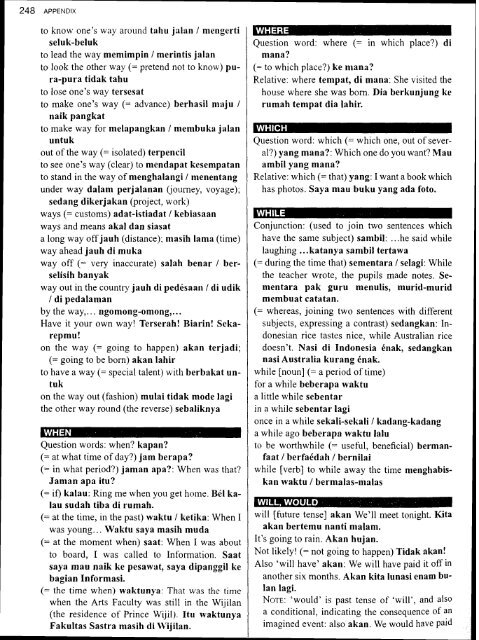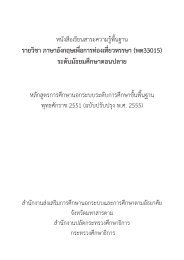bahasa indonesia
djenar-2003-a-students-guide-to-indonesian-grammar-oxford
djenar-2003-a-students-guide-to-indonesian-grammar-oxford
- No tags were found...
You also want an ePaper? Increase the reach of your titles
YUMPU automatically turns print PDFs into web optimized ePapers that Google loves.
to know one's way around Cahu jalan I mengerti<br />
seluk-beluk<br />
to lead the way memimpin 1 merintis jalan<br />
to look the other way (=pretend not to know) pura-pura<br />
tidak tahu<br />
to lose one's way tersesat<br />
to make one's way (= advance) berhasil maju i<br />
naik pangkat<br />
to make way for melapangkan I membuka jalan<br />
untuk<br />
out of the way (= isolated) terpencil<br />
to see one's way (clear) to mendapat kesempatan<br />
to stand in the way of menghalangi 1 menentang<br />
under way dalam perjalanan Cjourney, voyage);<br />
sedang dikerjakan (project, work)<br />
ways (= custon~s) adat-istiadat I kebiasaan<br />
ways and means aka1 dan siasat<br />
a long way offjauh (distance), masih lama (time)<br />
way ahead jauh di muka<br />
way off (= very inaccurate) salah benar I berselisih<br />
banyak<br />
way out in the countly jauh di ped6saa11 I di udik<br />
/ di pedalaman<br />
by the way,.. . ngomong-omong ,...<br />
Have it your own way! Terserah! Biarin! Sekarepmu!<br />
on the way (= golng to happen) akan terjadi;<br />
(=going to be born) akan lahir<br />
to have a way (= special talent) w~th berbakat untuk<br />
on the way out (fashion) mulai tidak mode lagi<br />
the other way round (the reverse) sebaliknya<br />
Question words: when? kapan?<br />
(=at what time of day?) jam berapa?<br />
(= in what period?) jaman apa?. When was that?<br />
Jaman apa itu?<br />
(=if) kalau: Ring me when you get home. B&l ka-<br />
Ian sudah tiba di rumah.<br />
(=at the time, In the past) waktu 1 ketika: When I<br />
was young ... Waktu saya masih muda<br />
(= at the moment when) saat: When I was about<br />
to board, I was called to Information. Saat<br />
saya mau naik ke pesawat, saya dipanpgil ke<br />
bagian Informasi.<br />
(= the tlme when) wektunja That was the trme<br />
when the Arts Faculty was st111 in the Wijilan<br />
(the residence of Prince Wijll). Itu waktunya<br />
Fakultas Sastra masih di \Vijilan.<br />
question word: where (= in which place?) di<br />
mana?<br />
:= to whlch place?) ke n~ana?<br />
Relative. where tempat, di mana. She visited the<br />
house where she was born. Dia berkur~jung ke<br />
rumah tempat dia lahir.<br />
Question word: whlch (= wh~ch one, out of several?)<br />
yang mana?: Which one do you want? Mau<br />
amhil yang mana?<br />
Relative: which (= that) yang: I want a book which<br />
has photos. Saya mau buku yang ada foto.<br />
Conjunction: (used to join two sentences which<br />
have the same subject) sambil. ... he said while<br />
laughing ... katanya sambil tertawa<br />
(= durlng the time that) sementara 1 selagi: While<br />
the teacher wrote, the pupils made notes. Sementara<br />
pak guru menulis, murid-murid<br />
memhuat catatan.<br />
(= whereas, joining two sentences with different<br />
subjects, expressing a contrast) sedangkan: Indonesian<br />
rice tastes nice, while Australian rice<br />
doesn't. Nasi di Indonesia inak, sedangkan<br />
nasi Australia kurang hak.<br />
while [noun] (= a period of time)<br />
for a while beberapa waktu<br />
a l~ttle while sebentar<br />
in a while sebentar lagi<br />
once in a while sekali-sekali I kadang-kadang<br />
a while ago beberapa waktu lalu<br />
to be worthwhile (= usef~l, beneficial) bermanfaat<br />
/ berfaidah / bernilai<br />
while [verb] to while away the time menghabiskan<br />
waktu I bermalas-malas<br />
will ~iture tense1 akan We'll meet tonight. Kita<br />
akan bertemu nanti malam.<br />
It's going to rain. Akan hujan.<br />
Not Ilkely! (= not going to happen) Tidak akan!<br />
Also 'w~ll have' akan: We will have paid it off in<br />
another six months. Akan kita lunasi enam hu-<br />
Ian lagi.<br />
NOTE. 'would' is past tense of 'will', and also<br />
a conditional, indicat~ng the consequence of an<br />
ilnag~ned event: also akan We would have paid<br />
-



